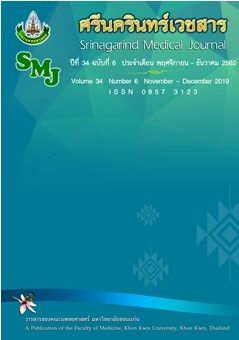The Guardian’s Beliefs on Psychotropic Medications Adherence of Autistic Pediatric Patients
Keywords:
Medications Adherence, Autistic patients, Medication taking behavior, Belief about psychotropic medicine, ความร่วมมือในการใช้ยา, ผู้ป่วยออทิสติก, พฤติกรรมการใช้ยา, ความเชื่อเกี่ยวกับยาจิตเวชAbstract
ความเชื่อของผู้ปกครองต่อความร่วมมือในการใช้ยาจิตเวชของผู้ป่วยเด็กออทิสติก
หนึ่งฤทัย สุกใส1, ธีระ ฤทธิรอด1*, นิรมล พจนสุนทร2, สมจิตร มณีกานนท์2, นิลวรรณ ชัยโย1,
ศุภาพิชญ์ แซมทอง1, รวีวรรณ เพียรวิทยาพันธุ์3, เชิญพร นาวานุเคราะห์1
1คณะเภสัชศาสตร์ มหาวิทยาลัยขอนแก่น อ.เมือง จ.ขอนแก่น 40002
2คณะแพทยศาสตร์ มหาวิทยาลัยขอนแก่น อ.เมือง จ.ขอนแก่น 40002
3สถาบันสุขภาพเด็กมหาราชินี ราชเทวี กรุงเทพฯ 10400
หลักการและวัตถุประสงค์: ความร่วมมือในการรักษาและปัจจัยที่มีผลต่อความร่วมมือเป็นสิ่งที่ส่งผลกระทบต่อการรักษาผู้ป่วยออทิสติกทั้งทางตรงและทางอ้อม การศึกษานี้จึงมีวัตถุประสงค์เพื่อหาระดับความร่วมมือในการใช้ยาจิตเวชของผู้ป่วยออทิสติก และหาปัจจัยที่ส่งผลต่อความร่วมมือในการใช้ยาจิตเวชของผู้ป่วยออทิสติก
วิธีการศึกษา: เป็นการศึกษาเชิงพรรณนาภาคตัดขวาง โดยเก็บข้อมูลจากผู้ปกครองของผู้ป่วยออทิสติกที่เข้ารับบริการ ณ แผนกผู้ป่วยนอก (จิตเวช) ของโรงพยาบาลศรีนครินทร์ ในช่วงเดือนมกราคม-สิงหาคม พ.ศ.2560 เครื่องมือที่ใช้เก็บข้อมูลคือ 1) แบบเก็บข้อมูลทั่วไปของผู้ปกครอง 2) แบบเก็บข้อมูลทั่วไปเกี่ยวกับผู้ป่วยออทิสติก 3) แบบสอบถามพฤติกรรมการใช้ยาสำหรับคนไทย (Medication Taking Behavior in Thai; MTB-Thai) มีค่าสัมประสิทธิ์แอลฟาของครอนบาค เท่ากับ 0.62 4) แบบสอบถามความเชื่อเกี่ยวกับยา (Beliefs about medicines questionnaire; BMQ) มีค่าสัมประสิทธิ์แอลฟาของครอนบาค 0.73 5.)โปรแกรม Electronic Data Capture and Coding Tool for Medication Regimen Complexity วิเคราะห์ข้อมูลด้วยสถิติ Mann-Whitney U test, Spearman’s rho correlation และ multiple logistic regression
ผลการศึกษา: กลุ่มตัวอย่างทั้งหมด 106 ราย ส่วนใหญ่เป็นเพศหญิง (ร้อยละ 79.2) อายุเฉลี่ย 42.7 ± 8.9 ปี มีความสัมพันธ์กับผู้ป่วยคือเป็นมารดา (ร้อยละ 73.6) จบการศึกษาระดับปริญญาตรีหรือเทียบเท่า (ร้อยละ 50.9) ประกอบอาชีพข้าราชการหรือพนักงานรัฐวิสาหกิจ (ร้อยละ 32.1) และสถานภาพสมรสส่วนใหญ่อยู่ด้วยกัน (ร้อยละ 75.5) จากการประเมินความร่วมมือในการใช้ยา โดยสอบถามจากผู้ปกครอง พบว่ามีความร่วมมือในระดับสูง จำนวน 61 ราย (ร้อยละ 57.5) และระดับปานกลาง 29 ราย (ร้อยละ 27.4) สาเหตุของความไม่ร่วมมือในการใช้ยา ส่วนใหญ่เป็นพฤติกรรมที่ไม่จงใจ เช่น การลืม โดยความเชื่อทั่วไปด้านอันตรายจากการใช้ยามีความสัมพันธ์ทางลบกับความร่วมมือในการใช้ยาจิตเวช (rs = - 0.295 , p= 0.016) ซึ่งกลุ่มผู้ปกครองที่ไม่มีความเชื่อเกี่ยวกับอันตรายของยาจะมีคะแนนความร่วมมือในการใช้ยามากกว่ากลุ่มที่มีความเชื่อดังกล่าวอย่างมีนัยสำคัญทางสถิติ (p=0.049) ส่วนปัจจัยอื่น ๆ ไม่พบว่ามีผลต่อความร่วมมือในการใช้ยาจิตเวชของผู้ป่วยออทิสติก
สรุป: ผู้ปกครองร้อยละ 57.5 มีความร่วมมือในการใช้ยาในระดับสูง และความเชื่อด้านอันตรายจากการใช้ยาเป็นปัจจัยที่มีความสัมพันธ์ทางลบกับความร่วมมือในการใช้ยา ทั้งนี้ควรมีการศึกษาในระยะยาวเพื่อค้นหาสาเหตุและปัจจัยอื่นๆต่อไป
Background and Objectives: Patient adherence and factors related to adherence directly and indirectly affect treatment of autistic pediatric patient. The aims of this research were to identify the adherence level of psychotropic medications in autistic patients and factors affecting patient adherence to psychotropic medications.
Methodology: A cross-sectional descriptive study was conducted in guardians of patients with Autism Spectrum Disorder (ASD) who attended psychiatric out-patient clinic at Srinagarind hospital during January to August 2017. The instruments consisted of 1) general information of guardians 2) general information of autistic patients 3) Medication Taking Behavior in Thai (MTB-Thai) which had Cronbach’s alpha coefficient at 0.62 4) Beliefs about medicines questionnaire (BMQ) which had Cronbach’s alpha coefficient 0.73 5.) Electronic Data Capture and Coding Tool for Medication Regimen Complexity program. Data were analyzed by Mann-Whitney U test, Spearman’s rho correlation and multiple logistic regression.
Results: There were 106 guardians included in this study. Most guardians were female (79.2%), the average age was 42.7 ± 8.9 years old, mother (73.6%), completed bachelor's degree (50.9%), government officers/state enterprise officers (32.1%) and married (75.5%). In term of medication adherence, 61 guardians (57.5%) showed high level and 29 guardians (27.4%) showed medium level of medication adherence. The major causes of medication adherence were due to the unintentional behaviors such as forgetfulness. General-Harm scale of belief about medication had significantly negative correlation with medication adherence (rs=-0.295, p=0.016). Guardians who don’t believe in the harm of medicine will have a significantly higher score in medication adherence than those who have such beliefs (p = 0.049). Whereas other factors were not significantly correlation.
Conclusions: 57.5% of the guardians had adherence score in high level. General-Harm scale of belief about medication is the factor that affect adherence score significantly. Long-term study should be done to be a further study to identify other causes and factors.
References
American Psychiatric Association. Diagnostic and statistical manual of mental disorder. 5thed. Washington DC: American Psychiatric Association; 2013.
Centers for Disease Control and Prevention. CDC estimates 1 in 68 children has been identified with autism spectrum disorder [online] 2016 July. [Accessed Sep 5, 2018]. Available from: http://www.cdc.gov/ncbddd/autism/ data.
Thai Autism Foundation. The situation of autism patient in Thailand 2553 [online] 2010 May. [Accessed Sep 5, 2018]. Available from http://oknation.nationtv.tv/blog/autisticthai/2010/06/04/entry-2.
Jobski K, Höfer J, Hoffmann F, Bachmann C. Use of psychotropic drugs in patients with autism spectrum disorders: a systematic review. Acta Psychiatr Scand 2017; 135: 8–28.
Williams PG, Woods C, Stevenson M, Davis DW, Radmacher P, Smith M. Psychotropic medication use in children with autism in the Kentucky Medicaid population. Clin Pediatr (Phila) 2012; 51: 923–7.
Wichaikam D, Watcharasinthu A. Use of health care services of children with autism at Yuwaprasart Waithayopathum Child Psychiatric Hospital. Chula Med J 2556; 57: 625-37.
Logan SL, Carpenter L, Leslie RS, Hunt KS, Garrett-Mayer E, Charles J, et al. Rates and predictors of adherence to psychotropic medications in children with autism spectrum disorders. J Autism Dev Disord 2014; 44: 2931–48.
Hock R, Kinsman A, Ortaglia A. Examining treatment adherence among guardians of children with autism spectrum disorder. Disabil Health J 2015; 8: 407–13.
Horne R, Chapman SC, Parham R, Freemantle N, Forbes A, Cooper V. Understanding patients’ adherence-related beliefs about medicines prescribed for long-term conditions: a meta-analytic review of the Necessity-Concerns Framework. PLoS One 2013; 8: e80633.
Conn KM, Halterman JS, Lynch K, Cabana MD. The impact of guardians’ medication beliefs on asthma management. Pediatrics 2007; 120: e521–6.
Pitisutham P, Pichiensoonthon C, (editor). Clinical research textbooks. Bangkok: Faculty of Tropical Medicine, Mahidol University; 2554
Sakthong P, Sonsa-Ardjit N, Sukarnjanaset P, Munpan W, Suksanga P. Development and psychometric testing of the medication taking behavior in Thai patients. Int J Clin Pharm 2016; 38:438-45.
Horne R, Weinman J, Hankins M. The beliefs about medicines questionnaire: The development and evaluation of a new method for assessing the cognitive representation of medication. Psychology & Health 1999; 14:1-24.
Lueang-somnapa Y, Leung-somnapa S, Phaeng S, Thasirasawat P, Kiewcha-am R, Suwattanakul W. Confirmatory component analysis, Thai language beliefs about medicine. JPMC 2557; 31: 297-310.
Libby AM, Fish DN, Hosokawa PW, Linnebur SA, Metz KR, Nair KV, et al. Patient-Level Medication Regimen Complexity across Populations with Chronic Disease. Clin Ther 2013; 35: 385-98.
Charuscharungkiat N, Watcharasinthu A. Quality of life of autism spectrum disorder patient’s care givers and related factors. JPAT 2556; 58: 233-44.
Arnold LE, Farmer C, Kraemer HC, Davies M, Witwer A, Chuang S, et al. Moderators, mediators, and other predictors of risperidone response in children with autistic disorder and irritability. J Child Adolesc Psychopharmacol 2010; 20: 83–93.
Moore TR, Symons FJ. Adherence to Behavioral and Medical Treatment Recommendations by Guardians of Children with Autism Spectrum Disorders. J Autism Dev Disord 2009; 39: 1173–84.


